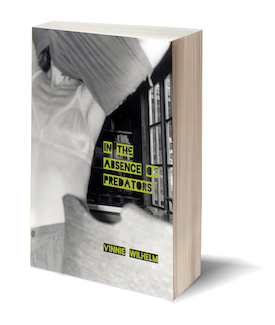|
 |
|---|
Reviewed by Marco Kaye
The writer's essential task, according to Proust, is to find connections between unlike things. This is enough reason to sit at a desk for a lifetime, striking various objects against each other to see what sparks. It turns out to be an effective impetus for fictional lives as well. In Vinnie Wilhelm's debut collection of stories, In the Absence of Predators, characters play detectives of a sort, searching for parallels between nature and their own mental landscapes. They look for, as Henry James put it, "the figure in the carpet," some sense of a guiding hand at work. But any signs prove unhelpful. " The very idea of reasons implies that we are living in a world of comprehensible phenomena, but the evidence argues otherwise," one character remarks. "The world," another says, "cannot be remade in a tidy fashion."
Over the course of five stories, we meet a Mexican bandit, a wandering factotum, a stockbroker, an occasional screenwriter and, in the final tale, a group of dissimilar men stranded in a diner as a blizzard rages outside. When present, Wilhelm's female characters play alluring and rational foils. They lead our protagonists deeper into mystery while never acknowledging its presence.
These characters are as bewildered as they are brave, and the situations they stumble into are entertaining, dark, and absurd. One imagines Wilhelm lighting his writerly cigarette off Shirley Jackson's and Kurt Vonnegut's. In "The Crying of the Gulls" a drifter named Sam Ogilvie rolls into a bar in the one stoplight town of Sheridan, Wyoming, after "driving west the way some people leap screaming from bridges and high windows." There, a woman named Virginia Clover recognizes Ogilvie, though they are strangers. When Sam drives her home drunk, Virginia drops her flirtation. She speaks of the Talking People, spirits who led her mother outside on a forty below night. The next morning Virginia is gone, but Sam notices her home abuts a kitty litter strip mine (yes, these things exist). Over a pancake breakfast, Virginia's father confirms a fortune of the absorbent clay is below their feet. Strange occurrences accumulate around Ogilvie, who senses the Talking People, both on the edges of town and at his job as a line cook. The best parts of the story, however, are observations of the non-paranormal. "They were waitresses in the way Ogilvie's father had been Army: it was in their carriage, how they spoke and applied eye shadow, the cigarettes they smoked." Or this one, later in the story, when Sam sees Virginia again after three years: "She wore their applause like a garland of roses." Though the story throws its hands up in the air with the final sentence, this seems to be the point. If clues are rare, meaning is rarer still.
"Fauntleroy's Ghost," the best story in the collection, is Wilhelm at his snappiest and most riotous. It's one of the funniest stories I've ever read. The opening line sums up what is to follow: "Stucky was not a screenwriter by trade, but the market for historical fiction was poor and it seemed incredible that no one had ever made a bio-pic about Trotsky." Ben Stucky arrives in L.A. shaking off Seattle's "bone-damp" fog. His last visit, nearly a decade ago, ended terribly:
Shouting after his lover as her Hyundai peeled out onto Sunset, watching her upraised middle finger stare back at him as it receded towards Los Feliz, standing in the sun in a blue suit he'd be wearing for three days, Stucky realized that he had unwittingly entered the dream logic of the great and sprawling city: he was enacting a scene from a movie.
The finger that stares back is a neat effect in Wilhelm's bag of tricks. In another story, spinach lasagna does the same. Even the material world is a living, breathing entity here.
Stucky attempts to breathe life into Trotsky, much to the chagrin of various Hollywood producers. He's like Barton Fink without the writer's block. So erudite and voluble is he on Trotsky lore, when he presents his script it's hilarious mainly because Wilhelm does such a fantastic job summarizing the revolutionary's life. He overwrites the Trotsky sections to great effect; the contrast between the scholarly tone of Stucky's pitch and the crass studio execs makes for funny, bathetic moments.
An old college friend named Raskin is the story's driving force:
Raskin never changed. This, in fact, was the purpose of Raskin. Whenever you stepped in gum or were shat on by a bird, you could take comfort in the knowledge that somewhere in the world, at that very moment, Raskin was probably getting blown in a limo.
Through Raskin and his beautiful girlfriend Nathalie, Stucky finds his way into a cover-up of a snuff film depicting the execution of real life Congolese independence leader Patrice Lumumba. Ultimately, Stucky isn't sure how much Raskin is deceiving him, but the ending isn't overly ambiguous. It feels exactly the way a short story should end, which made me surprised and thrilled to find out that "Fauntleroy's Ghost" is actually an excerpt of a novel Wilhelm is working on. This bodes well for our future reading lives.
The final, titular story is told in the ronde, with six different characters talking about personal encounters with deer. Each vivid recollection edges the border between fantasy and reality, exactly where Wilhelm is most comfortable. After hitting a deer with his car, one character sits beside the animal until, "I started to understand what it was saying. Not directly, but I started to get this idea in my head of what the deer was trying to tell me."
Now there's this idea in my head. Look closely, listen deeply, and you may be able to gain some greater meaning. But in all likelihood, that meaning will be impossible to translate.
